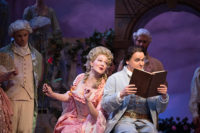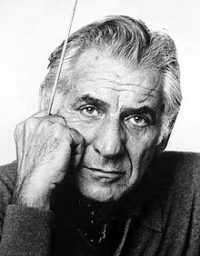by Jarrett Hoffman

The day after the United States turn 242, Ohio Light Opera will celebrate two more birthdays — the company’s 40th and Leonard Bernstein’s 100th — when they present that composer’s 1956 comic operetta Candide. Performances begin on July 5 at 2:00 pm in Freedlander Theatre at the College of Wooster and continue through August 10. (See their calendar for details.)
Directed by Steven A. Daigle and conducted by Steven Byess, the production also marks OLO’s first-ever performance of any Bernstein work. Ted Christopher, Alexa Devlin, Stephen Faulk, Benjamin Krumreig, Hannah Kurth, Daniel Neer, Sarah Polinski, and Stephen Walley will take on a cast of characters who are repeatedly killed, only to bizarrely turn up again in far-off locales and ever-stranger situations.
The origins of Bernstein’s comic opera can be traced back to the middle of the 18th century, to Voltaire’s biting satire and magnum opus, Candide. The novella skewers religion, government, war, and philosophy — and was promptly banned after its 1759 publication. (Even U.S. customs seized copies into the 1930s.) And as is common with artistic works that infuriate those in power, the book became wildly popular.
Fast-forward to the 20th century, when playwright Lillian Hellman became inspired to transform Voltaire’s tale into a play with incidental music, until Bernstein convinced her of its potential as an operetta. The work’s 1956 original Broadway production, with book by Hellman and lyrics by Richard Wilbur, John Latouche, and Dorothy Parker, was unsuccessful, though Bernstein’s score received critical acclaim.

Perhaps the most remarkable performance came in 2008, in Pyongyang, North Korea, when the New York Philharmonic played the famous Candide Overture as an encore to a concert that was broadcast on North Korean state television. And while another encore that evening, the Korean folk song Arirang, inspired the more emotional reaction, the inclusion of Bernstein certainly points to the far reach of his music, and to his importance in our national musical identity.
Published on ClevelandClassical.com July 3, 2018.
Click here for a printable copy of this article



